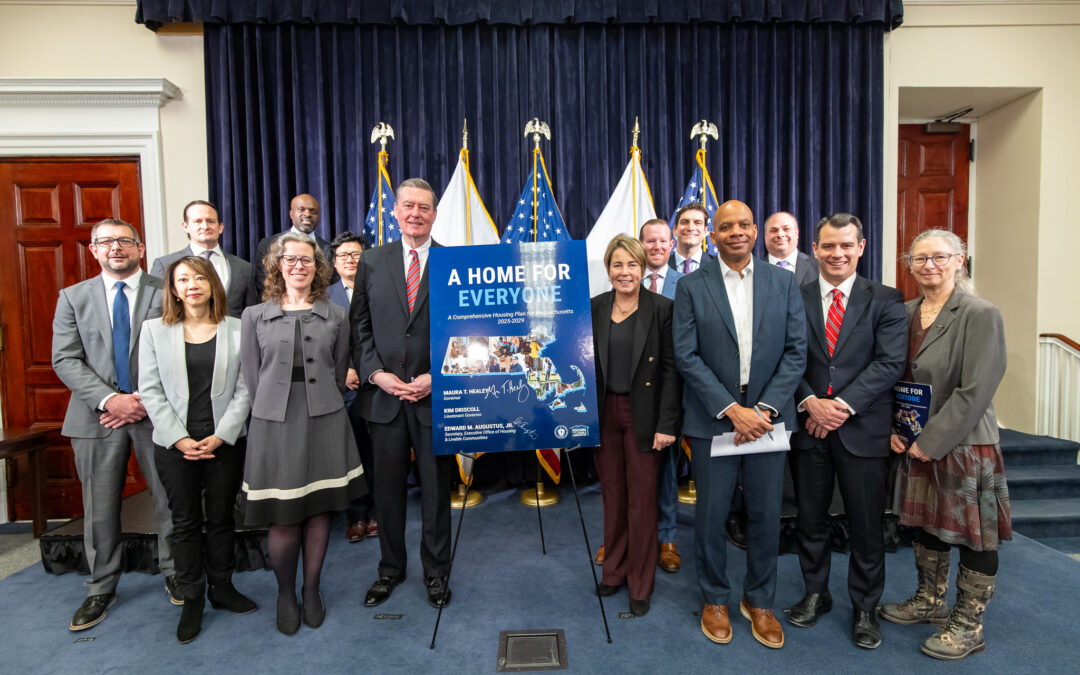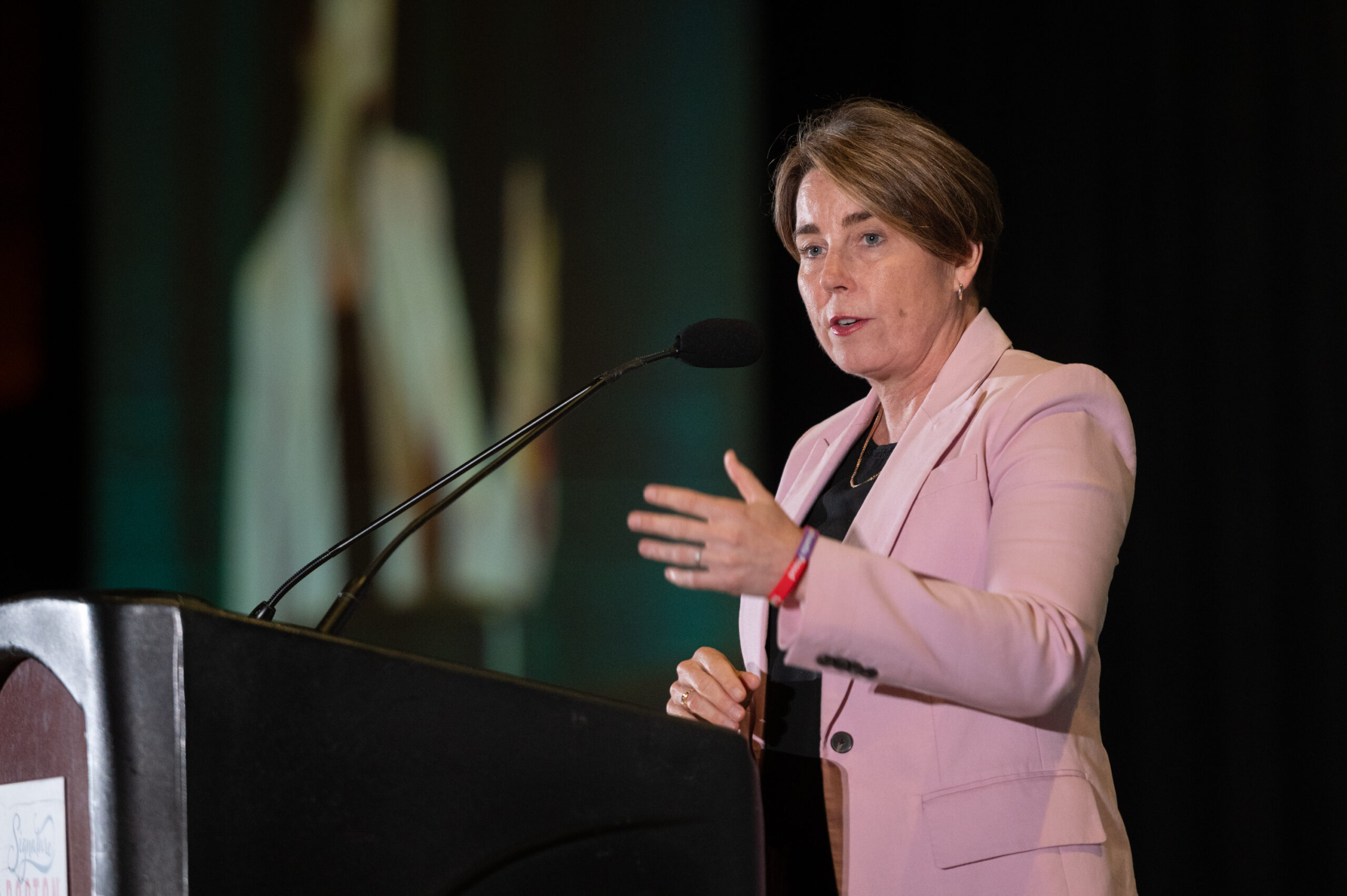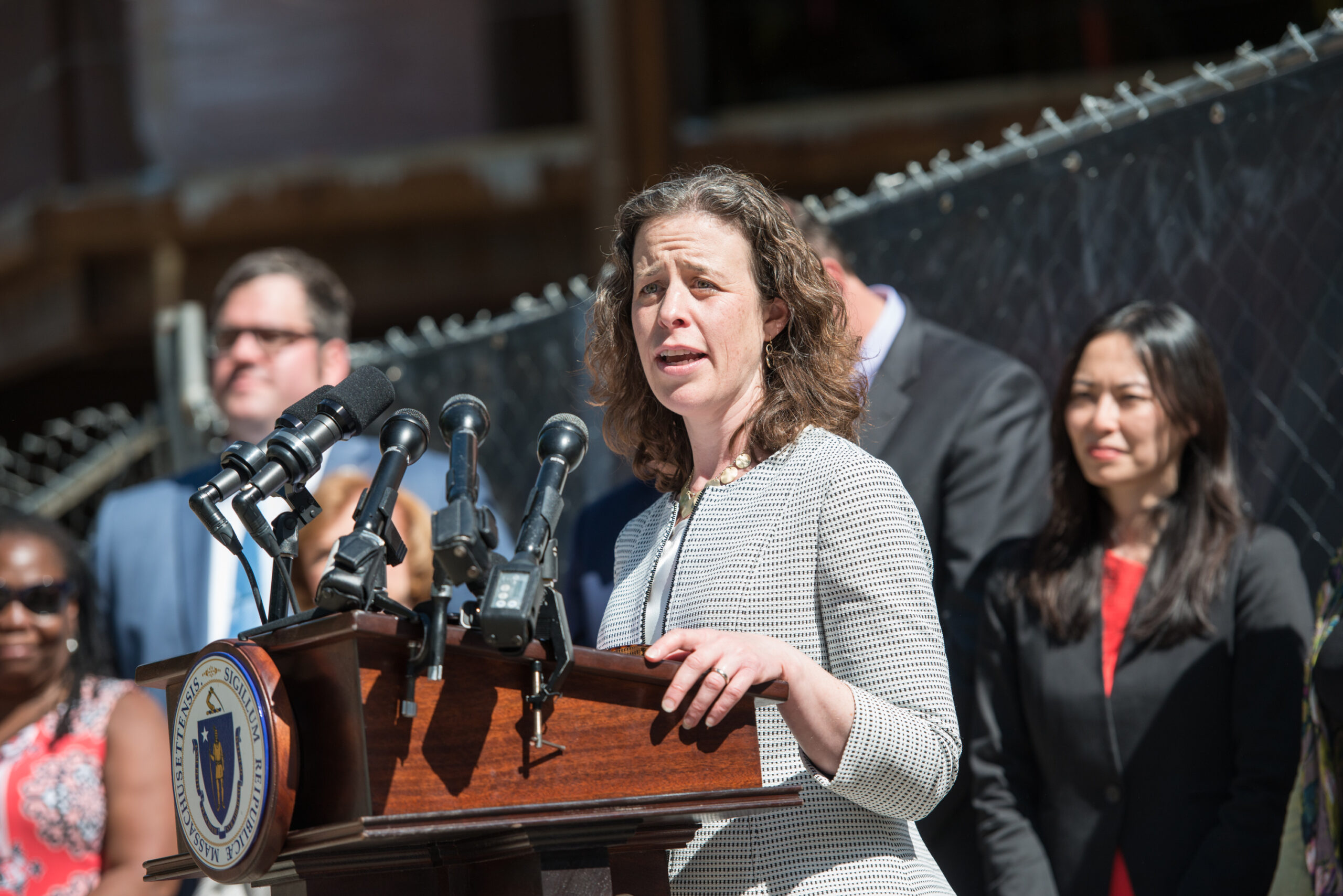by Matt Noyes | Feb 21, 2025 | Housing News
Two weeks after the release of the Statewide Housing Plan, the Unlocking Housing Production commission completed its work with the release of a range of policy recommendations designed to facilitate the creation of the homes Massachusetts needs to thrive.
Building for Tomorrow: Recommendations for Addressing Massachusetts’ Housing Crisis incorporates the work of the Unlocking Housing Production Commission, which was made up of more than a dozen housing leaders from across the Commonwealth.
The report makes a range of proposals with a goal of modernizing the state’s housing policies, lowering production costs, increasing housing supply, and ensuring sustainable and equitable growth. These are divided into four areas of focus:
- Economic Incentives and Workforce Development
- Land Use and Zoning
- Regulations, Codes, and Permitting
- Statewide Planning and Local Coordination
CHAPA applauds the Healey-Driscol Administration for their continued prioritization of housing and for putting forward a bold slate of proposals that hold a great deal of promise in addressing our housing needs.

by Jenna Connolly | Feb 7, 2025 | Featured News, Housing News
A result of more than a year of engagement with stakeholders and the work of the Housing Advisory Committee, Governor Healey released A Home for Everyone: Massachusetts’ Statewide Housing Plan on February 6. A priority for CHAPA, the Affordable Homes Act included a requirement that the Commonwealth develop a statewide housing plan every five years. The Healey-Driscoll Administration launched this process in October 2023 following the filing of the Housing Bond Bill.
The new plan outlines the housing challenges facing Massachusetts, identifies current unmet housing needs, sets goals for production and preservation, and proposes strategies to address the situation. This publication will be followed by others, including expanded needs assessments and strategies.
CHAPA joined the other leaders of the Supportive Housing Pipeline Coalition, a coalition of more than 80 member organizations dedicated to creating the supportive housing needed to address chronic and high-need homelessness, in issuing a statement in support of A Home for Everyone.
Here is the quote from CHAPA CEO Rachel Heller included in the statement:
“The solution to homelessness is housing that is affordable and housing that provides supportive services. We applaud the Healey-Driscoll Administration’s Housing Plan, which sets the Commonwealth on a path to create and preserve the homes needed to reduce and prevent homelessness, expand housing that is accessible for people with disabilities, and provide opportunities for everyone to have safe and healthy homes they can afford in the communities they choose. This plan identifies strategies for creating the diversity of housing needed to meet our wide ranging needs, including supportive housing, public housing, and deeply affordable housing.”
by Jenna Connolly | Feb 3, 2025 | Housing News
In December, the Executive Office of Housing and Livable Communities (EOHLC) extended the deadline to submit public comments on proposed regulatory changes to Chapter 40B, Massachusetts’ affordable housing law. Since its enactment, 40B has been one of the most effective tools for creating affordable housing in the Commonwealth, allowing developers to bypass local zoning restrictions in municipalities that have not reached a minimum threshold of affordable homes in their community.
The proposed regulatory changes would eliminate the interlocutory period during which municipalities can claim safe harbor from 40B. It would also direct EOHLC to create a General Land Area Minimum (GLAM) Inventory to provide clear information to developers, municipalities, and residents. Although CHAPA appreciates the attempt by EOHLC to streamline the 40B process, we are concerned that there may be unintended negative consequences for municipalities and for developers.
On January 31, CHAPA submitted written feedback to EOHLC on the proposed regulations. We hope that EOHLC will take the issues raised in our letter into account when the regulations are finalized.
by Jenna Connolly | Jan 28, 2025 | Housing News
Following the end of a public comment period that ended earlier this month, the Executive Office of Housing and Livable Communities (EOHLC) has released final regulations related to definitions and details about the administration of the Accessory Dwelling Unit (ADU) provisions of the Zoning Act. The regulations will become final when they are published in the Massachusetts Register, which is expected to happen at the end of this week.
The final ADU regulations are largely the same as the draft proposal that was released in December. Among the changes are:
- Clarification that municipalities cannot restrict occupancy of ADUs to familial relations of the primary residence owner.
- An allowance for municipalities to more stringently restrict the use of ADUs as short-term rentals.
- Prohibition on requirements by municipalities for separate utility or sewer hookups for ADUs unless required by a utility provider.
- Prohibition on the requirement of environmental standards for ADUs that are more stringent than those required of traditional single-family homes.
- Allowance for ADUs in non-conforming structures.
- No minimum lot sizes.
- Dimensional standards and setbacks cannot be more stringent than for primary residences on non-conforming lots.
- Clarification for parking requirements for ADUs located in proximity to bus routes with flag stops.
In the coming weeks, EOHLC is expecting to release model ADU zoning that can be used as a resource for municipalities.

by Jenna Connolly | Jan 22, 2025 | Featured News, Housing News
Today, Governor Healey unveiled her budget proposal for Fiscal Year 2026. CHAPA is pleased that during what is shaping up to be a challenging fiscal year, this legislation largely maintains the Commonwealth’s commitment to investing in housing, with increases put forward for several important programs.
An overview of the Governor’s H1 budget proposal compared to the final FY26 budget is available here.
Still, more must be done. While the FY26 proposal includes a higher funding level than FY25, costs continue to rise. Far too many Massachusetts residents are struggling to find a home they can afford. Failure to provide adequate resources to address actual housing needs will only result in hardship for impacted households and increased costs in other areas for the Commonwealth.
Over the next six months, CHAPA will be joining with our members and partners to advocate for the funding we need to help address our housing challenges. The Governor’s proposal is the first step in a long budget process that now moves to the Legislature.
For a more detailed discussion of the Governor’s budget proposal as well as an opportunity to provide input into advocacy strategy, please join us on Thursday, January 25 at 10:30am on Zoom for the Building Blocks Coalition meeting. Registration is required and is available on the CHAPA website.

by Jenna Connolly | Jan 17, 2025 | Featured News, Housing News
Friday marked an important date in the new legislative session as it is the deadline for on-time filing of bills. Over the past several months, CHAPA has been working with stakeholders, policy makers, and legislators to develop a slate of priority legislation that we will be advocating for over the next two years. Our sincere thanks go out to everyone who participated in this process, but especially the legion of State House staffers who do remarkable work in helping to shape policy ideas into actual bills.
Below is CHAPA’s slate of priority bills, which have been assigned temporary docket numbers until they are sent to committees of jurisdiction, where they will receive bill numbers.
Please contact your state representative and senator to urge them to add their name as a cosponsor of these bills:
People
- Codification of the Massachusetts Rental Voucher Program (MRVP) – HD 2020 & SD 1573.
- Updating the Alternative Housing Voucher Program (AHVP) Statute – HD 1953 & SD 1708.
- Access to Counsel in Evictions – HD 3912 & SD 1771.
- Eliminating Mandatory Broker Fees for Tenants – SD 35.
- Establishing a Matched Savings Program – HD 3851 & SD 2106.
Production
- Yes In God’s Back Yard (YIGBY) to Allow Multi Family By-Right on Religiously-Owned Property – HD 3756 & SD 1663.
- Creating a Local Option Real Estate Transfer Fee – HD 1112 & SD 1216.
- Increasing the Deeds Excise Tax to Support Affordable Housing and Environmental Adaptation – HD 2997 & SD 846.
- Creating an Interagency Supportive Housing Finance and Strategy Board – HD 3758 & SD 2594.
- Establishing a Housing Production Goal for Massachusetts – HD 3920.
Preservation
- Creating a Commission to Examine Increasing Property Insurance Rates on Affordable Housing – HD 3370 & SD 876.
- Establishing a Zero Carbon Renovation Fund – HD 3171 & SD 1325.
Planning
- Yes In My Back Yard (YIMBY) to Eliminate Barriers to Housing Production – HD 3248 & SD 1913.
- Promoting Affordable and Fair Housing Through Inclusive Zoning – HD 2978 & SD 811.
- Establishing a Definition for Municipal Site Plan Review – HD 2362.
- Mandating Training for Local Land Boards – HD 2395 & SD 114.



